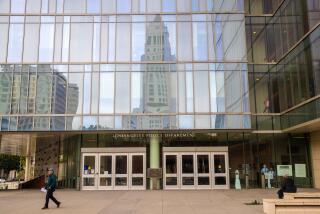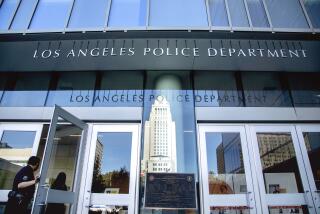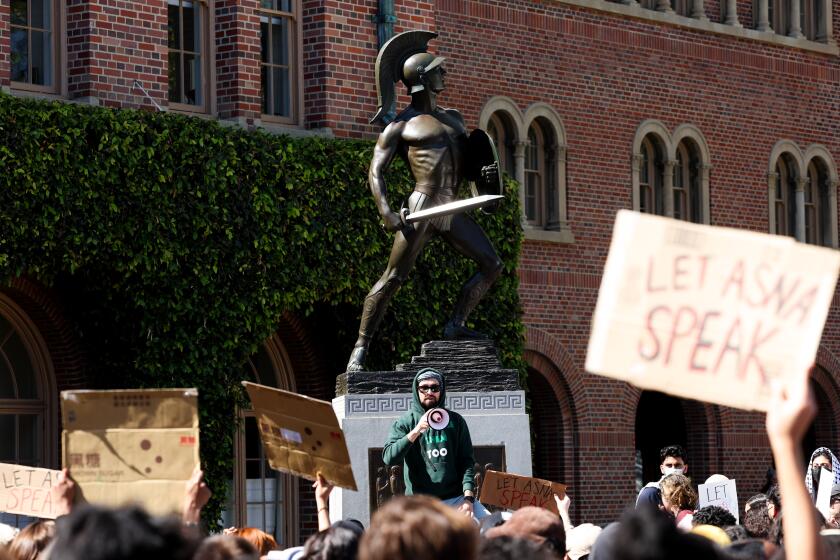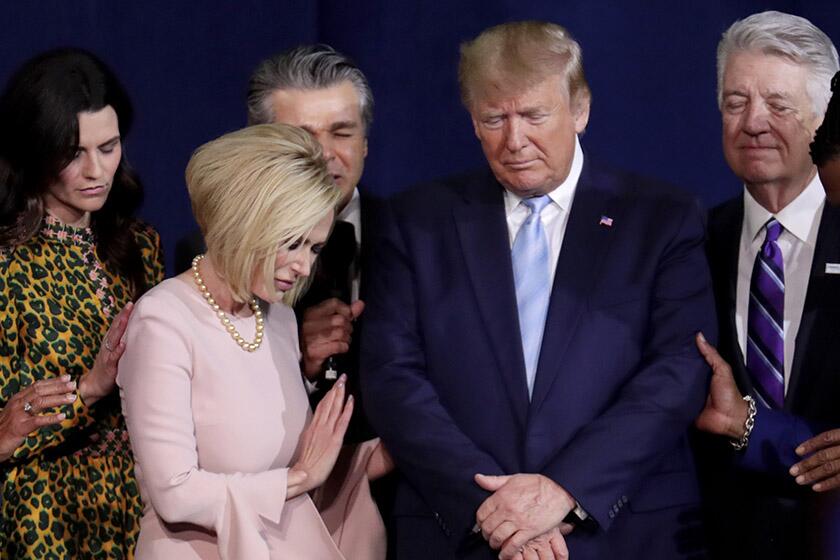LAPD Chief Charlie Beck’s side
In the three-plus years since Charlie Beck put on the chief’s badge at the LAPD, his goal has been to consolidate a modern, multiethnic, publicly responsible 10,000-officer department, as envisioned in the rattling reforms of 15 and 20 years ago. The chief’s recent trial by fire was about one ex-probationary cop named Christopher Dorner and the manhunt that ended in Dorner’s death, consumed millions in law enforcement dollars and ate up, for the moment at least, some fraction of the goodwill the LAPD has been working to bank. With investigations launched into Dorner’s claims and the LAPD’s use of force, Beck sizes up the fallout so far.
Before we speak about the Dorner case, Tuesday is election day. Make your case for Proposition A, the proposed half-cent city sales tax increase.
I believe the shortfall in the city budget will directly impact public safety. Do I think this is a perfect solution? No, but it’s the only solution I see. None of the people who oppose A have come up with any reasonable alternative.
What about “cut cut cut”?
We’ve already cut cut cut. The Police Department has suffered over $100 million in budget cuts every year for three years. I haven’t hired a garage mechanic, a technical criminalist, a 911 operator for three years. This can’t continue. We’ve been able to keep pace with police hiring because it’s so politically difficult for that not to happen, and I’ve got a mayor who supports me, thank heavens, but the infrastructure is crumbling. You can complain that the special fund departments [DWP, airports and harbors] don’t contribute significantly to the general fund, but that would take a change in law. This Police Department has been immensely successful at providing public safety, but we are at the breaking point.
Now, for Dorner. Does he have the potential to be a game-changer for the Los Angeles Police Department, as Rodney King was?
I don’t think this is a Rodney King moment — not at all. Dorner was a probationary employee. He’d only spent 100 days in uniform. He spent 13 months in the police academy after shooting himself in the hand; he works a short time in the field, becomes active [overseas] in the military then comes back. We extended his probation because you have to complete your probationary period. I want to do the biopsy [of his termination]. We will see. And I will be absolutely open to whatever the investigation delivers.
What do you make of comments, supposedly from former officers, who said they understood what Dorner meant, that there is a racist element in LAPD discipline and problems in dealing with whistle-blowers?
Some of those people were from the 1990s, and I don’t have any opinion about whether they were mistreated or not. If somebody has something from the current LAPD, under my command, I will look at it. Very few people think they were legitimately terminated, and some people try to attach other significance to it.
The LAPD has made a lot of strides, but we still are not perfect, and neither is any other organization. But we are by far the most diverse part of L.A. government. We’re more diverse than the City Council, the Fire Department, the DWP, you name it. We are a majority of minorities: 34% Hispanic, 11% African American, 20% female. Find me a more diverse [city] organization.
There were handmade signs: “Go Dorner go.” People made a folk hero out of him. Why?
Part of that is the Internet — the ability of people on the fringes to connect and build rationalizations of his actions. Some of it comes from the way Americans love anti-heroes.
You can look at movies and books — Billy the Kid, Butch Cassidy and the Sundance Kid, and I’m just starting with the Westerns. Dirty Harry is an anti-hero. Rambo is an anti-hero. Dorner is not an anti-hero.
But to have an anti-hero you need to rail against an evil empire, where there’s the sheriff of Nottingham There’s always an evil empire. And we [the LAPD] make a great evil empire. All of this clicks into what these people want: a lazy, easy way to think about this.
How do you account for the anti-police sentiment, the idea that government is the enemy?
This falls into the gun debate, and the [people] who don’t believe government has any authority over them, rhetoric the Internet just feeds.
You’re concerned that Dorner’s grievances would resonate among African Americans.
It feeds into a past perception of the LAPD that has some validity. It feeds into Rodney King, into Rampart, all of that. What I’m saying is we’ve become better.
What about the Dorner case and the handcuffed woman who was Tasered; the officer who stomped on a woman who was already restrained. Is there a pattern here?
We deal in conflict. We’re always going to have officers who make mistakes or things in the media that are distasteful to look at. Police work is not always pretty. That doesn’t make everything that happens right. We have a great process that looks at complaints. I caution people not to automatically assume police misconduct until you see the investigation.
The massive rollout to protect police from Dorner generated criticism that the department put fellow cops’ safety first.
These folks put themselves at significantly more risk than the general public. They put on a uniform that screams “Target,” that screams “I am the representation of authority.” You have to protect people who do that; otherwise nobody will do it. So I make no apologies for that.
Every day, law enforcement put themselves at risk for people they don’t know. When they become targets just because of what they do — you want to talk about prejudice? You want to talk about unfair? Imagine being targeted by Dorner regardless of whether you had any involvement [in his career]. You would think differently. This is no different on a certain level [than] being targeted because of your race.
Will Dorner cause you to be looking at the procedures for reintegrating veterans in the department?
We do a lot [already]. It’s two to four weeks, longer if needed. It includes medical, physical and psychological [elements]. It includes retraining on new policies or laws. I recognize the vast difference between the military and the police. Sometimes people who aren’t in the business say, “Well, they’ve both got guns and uniforms, so it’s pretty much the same thing.” It isn’t even close. The rules of engagement are completely different. The methods are completely different. We really have to make sure people have the necessary tools to come back to policing from the military.
This was a big national story, so if Anderson Cooper called —
I knew that I had to do an interview right after it happened. And I didn’t choose Anderson Cooper. I chose [KCAL anchor] Pat Harvey. She’s local. I chose her because I respect her, she’s covered me before, she’s been fair, she’s African American, she has a great African American audience that respects her. I could have done “60 Minutes.” I don’t care about that. I care about L.A.
What did you think when you read Dorner’s manifesto?
I was reminded of other manifestoes . You can see the cracks in the logic, the non sequiturs. I did recognize how much time he’d spent writing it. I thought, wow, he’s been working on this for months. It certainly made me believe we were dealing with someone who had a plan.
[In it] he constantly talks about clearing his name, and that strikes a chord with people, but not when you realize he’s trying to clear his name through homicide. You can’t clear your name through homicide. He knows that. So what does he really want to do? What is he really saying? He’s really saying he wants to create a posterity in which he is more significant than other people.
And remember, he picked his fate. I’m not saying he picked being burned, but he knew when he was in that cabin that there were only two ways out: He could surrender, or if he kept doing what he was doing, he was going to die. And he chose the latter.
You would have preferred that he surrender?
Of course. We are not the executioners of society. That’s not what the goal of policing is.
You’re a second-generation cop; your kids are on the force. Has all of this made you do any soul searching about the profession?
I’m an introspective guy; I think about this all the time. You hear folks rail against authority, but what’s the option? Are we not going to protect those who can’t protect themselves? Are we not going to make sure the will of the strong doesn’t oppress the rights of the weak? We have to. That’s what society is about. That’s why humankind banded together, so that the evilest, strongest, biggest person didn’t rule.
We have great responsibility. I don’t think any profession, any department, is as scrutinized as ours. That’s legitimate, because we [are given] the right to take away personal freedom, even human life.
Follow Patt Morrison on Twitter @pattmlatimes
This interview was edited and excerpted from a taped transcript. An archive of Morrison’s interviews can be found at latimes.com/pattasks.
More to Read
A cure for the common opinion
Get thought-provoking perspectives with our weekly newsletter.
You may occasionally receive promotional content from the Los Angeles Times.







